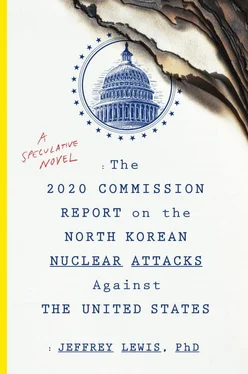Jeffrey Lewis - The 2020 Commission Report on the North Korean Nuclear Attacks Against the United States
Здесь есть возможность читать онлайн «Jeffrey Lewis - The 2020 Commission Report on the North Korean Nuclear Attacks Against the United States» весь текст электронной книги совершенно бесплатно (целиком полную версию без сокращений). В некоторых случаях можно слушать аудио, скачать через торрент в формате fb2 и присутствует краткое содержание. Город: New York, Год выпуска: 2018, ISBN: 2018, Издательство: Mariner Books, Жанр: Фантастика и фэнтези, Триллер, на английском языке. Описание произведения, (предисловие) а так же отзывы посетителей доступны на портале библиотеки ЛибКат.
- Название:The 2020 Commission Report on the North Korean Nuclear Attacks Against the United States
- Автор:
- Издательство:Mariner Books
- Жанр:
- Год:2018
- Город:New York
- ISBN:9-781-328-57391-9
- Рейтинг книги:4 / 5. Голосов: 1
-
Избранное:Добавить в избранное
- Отзывы:
-
Ваша оценка:
- 80
- 1
- 2
- 3
- 4
- 5
The 2020 Commission Report on the North Korean Nuclear Attacks Against the United States: краткое содержание, описание и аннотация
Предлагаем к чтению аннотацию, описание, краткое содержание или предисловие (зависит от того, что написал сам автор книги «The 2020 Commission Report on the North Korean Nuclear Attacks Against the United States»). Если вы не нашли необходимую информацию о книге — напишите в комментариях, мы постараемся отыскать её.
The 2020 Commission Report on the North Korean Nuclear Attacks Against the United States — читать онлайн бесплатно полную книгу (весь текст) целиком
Ниже представлен текст книги, разбитый по страницам. Система сохранения места последней прочитанной страницы, позволяет с удобством читать онлайн бесплатно книгу «The 2020 Commission Report on the North Korean Nuclear Attacks Against the United States», без необходимости каждый раз заново искать на чём Вы остановились. Поставьте закладку, и сможете в любой момент перейти на страницу, на которой закончили чтение.
Интервал:
Закладка:
Similar psychological tactics, officials believed, would be effective against North Korea and, specifically, its young leader, Kim Jong Un. This conclusion reflected a broader consensus within the US intelligence community that Kim Jong Un was rational and could be deterred. American policy toward North Korea had been guided by this idea in the years leading up to the 2018 thaw, leading officials to propose aggressive measures to keep Kim in check. With the collapse of diplomatic efforts between the United States and North Korea, the president’s advisers returned to proposals for forceful methods to address North Korea’s growing nuclear and missile capabilities.
SCATHE JIGSAW was among the less aggressive proposals considered by the Trump administration for combating the challenge presented by North Korea. One faction, including former national security adviser John Bolton and speechwriter Stephen Miller, favored what some have called a “punch in the nose” or a “bloody nose”—a limited military strike to destroy a North Korean facility related to its missile program. (White House officials strenuously denied using either term. “The phrase has never, ever been uttered by anyone in the White House,” said one former administration official involved in Asia policy.) The other faction feared that North Korea would respond to such a strike with disproportionate force, creating a dangerous dynamic that could lead to rapid and uncontrollable escalation between the two sides. These officials proposed a psychological operations campaign as a less volatile, less public option—one aimed at frightening Kim Jong Un without forcing him to retaliate.
The implications of this tactic do not seem to have been fully thought through by the officials who suggested it. According to one former Pentagon official, the original purpose behind the proposal for psychological operations was to dampen talk about a military strike within the White House. “You can’t beat something with nothing,” she explained. “The purpose of the psychological operations was to have a strong containment alternative to the military strike that Bolton kept pushing.” The proposal garnered widespread support within the Trump administration after it became evident that the main alternative—the so-called punch in the nose—carried even greater risks.
The White House, in a National Security Council (NSC) meeting on November 18, 2019, directed the Air Force to develop a psychological operations campaign against North Korea that would include air probes near and along the North Korean border. The program that the Air Force developed consisted of frequent but irregularly timed bomber flights in which small numbers of American aircraft would fly directly at North Korean airspace, forcing North Korean units to turn on their radars and aircraft to go on alert. Administration officials pointed to a tweet sent by President Trump as confirming, in a general way, the initiation of psychological operations.
Donald J. Trump@tehDonaldJTrump
If China doesn’t get little Rocket Man under control, we’re going to start RATTLING THE POTS AND PANS.
After the tweet, officials inside the White House began calling the campaign “Pots and Pans.” The term appears to have originated with Secretary of Defense James Mattis. “The idea was to take the Reagan plan,” one official testified, “and to do the same thing to Kim Jong Un. Mattis said we should ‘rattle our pots and pans’ to frighten Kim and show the Chinese we mean business. The president just kind of tweeted that, verbatim.”
It is important to note that there are differences between how the Pentagon and the White House saw SCATHE JIGSAW. In Air Force documents, the effort is described as a “ferret” mission to map North Korean radar sites and determine the readiness of North Korean air defense units. Such missions had been flown routinely during the early part of the Cold War, until they were suspended following a 1969 incident in which a US reconnaissance aircraft was shot down by North Korean MiG fighter jets.
The emails and text messages of White House officials suggest, however, that for them the more important goal of SCATHE JIGSAW was to unsettle Kim Jong Un and his military leaders. A secondary objective was to persuade leaders in Beijing that a failure to resolve the crisis on the Korean Peninsula might result in a military conflict. The guidance to the Air Force provided by the White House, under Bolton’s signature, makes only passing reference to the military value of intelligence gained from such missions and describes the option nearly exclusively in terms of the impact it might have on Kim and other North Korean leaders. The guidance directs the Air Force to develop a plan to “deliver the message of war” to leaders in Pyongyang and Beijing and take steps to “win the battlefield of perception.” A clearer statement of the purpose of this effort is written in the margins of a draft copy of the order, retained by Bolton: “PRESIDENT SAYS KNOCK SOME SENSE INTO THAT FAT CRAZY KID.”
White House and Pentagon officials were unanimous in their belief that the psychological operations campaign against the Soviets had been successful in frightening Soviet leaders, who had subsequently acted far more cautiously, and that it would similarly prove a workable approach for the current standoff with North Korea. In advocating for this tactic, Secretary of Defense Mattis sided with those officials in the administration who believed the bomber flights to be less provocative than the “bloody nose” approach.
Yet this course of action also contained certain dangers that, by now, are obvious. Specifically, the White House was directly warned that previous psychological operations had resulted in the loss of both military and civilian aircraft and ships. A classified “memo to holders”—prepared by the Central Intelligence Agency (CIA) in response to a White House inquiry about the consequences of this possible course of action with regard to North Korea—noted that past efforts had carried significant risks:
WE ASSESS THAT A ROBUST PSYOP CAMPAIGN CARRIES SOME RISK OF ESCALATION BASED ON PAST EXPERIENCE WITH SUCH MISSIONS. NORTH KOREA SEIZED A US INTELLIGENCE GATHERING VESSEL IN 1968 AND SHOT DOWN A US RECONNAISSANCE AIRCRAFT IN 1969. THE REAGAN-ERA EFFORT TO PROBE SOVIET AIR DEFENSES WAS ALSO A SIGNIFICANT FACTOR IN THE SOVIET SHOOTDOWN OF KAL 007 IN 1983, WHICH TRIGGERED THE WORST SUPERPOWER CONFRONTATION SINCE THE CUBAN MISSILE CRISIS.
Perhaps because of this warning, the White House decided that the psychological operations campaign was best conducted in secret, and staff took unusual measures to guard against further leaks, such as the president’s tweet. “The idea was to keep ‘Pots and Pans’ limited to a small circle,” one of Bolton’s aides explained. “Only the core staff at the White House and Mattis’s people executing it would know about the program, along with the Chinese and North Koreans, of course.” White House officials discussed whether to approach civil maritime and aviation authorities about altering air and sea routes, but decided not to do anything that might result in the public disclosure of SCATHE JIGSAW. Moreover, the Trump administration chose not to notify South Korean authorities about the full extent of the program, although the South Koreans understood generally that the additional flights through their airspace were part of a more aggressive American military posture.
“The whole point of the campaign was that it was supposed to be a secret,” one adviser explained. “If you start approaching shipping companies and airlines, then it will be in the paper the next day and Kim will be forced to respond.”
It is unclear how many senior officials knew about this program. There are references in the emails of half a dozen White House staff members, including National Security Adviser Bolton. More ambiguous references appear in emails and text messages among a larger group that mention “Ivanka’s new line of kitchenware,” which one official claimed was a tongue-in-cheek reference to SCATHE JIGSAW. The program was sizable enough, and Trump’s tweet drew enough attention, that many officials believed that word of it must have spread around the White House.
Читать дальшеИнтервал:
Закладка:
Похожие книги на «The 2020 Commission Report on the North Korean Nuclear Attacks Against the United States»
Представляем Вашему вниманию похожие книги на «The 2020 Commission Report on the North Korean Nuclear Attacks Against the United States» списком для выбора. Мы отобрали схожую по названию и смыслу литературу в надежде предоставить читателям больше вариантов отыскать новые, интересные, ещё непрочитанные произведения.
Обсуждение, отзывы о книге «The 2020 Commission Report on the North Korean Nuclear Attacks Against the United States» и просто собственные мнения читателей. Оставьте ваши комментарии, напишите, что Вы думаете о произведении, его смысле или главных героях. Укажите что конкретно понравилось, а что нет, и почему Вы так считаете.












